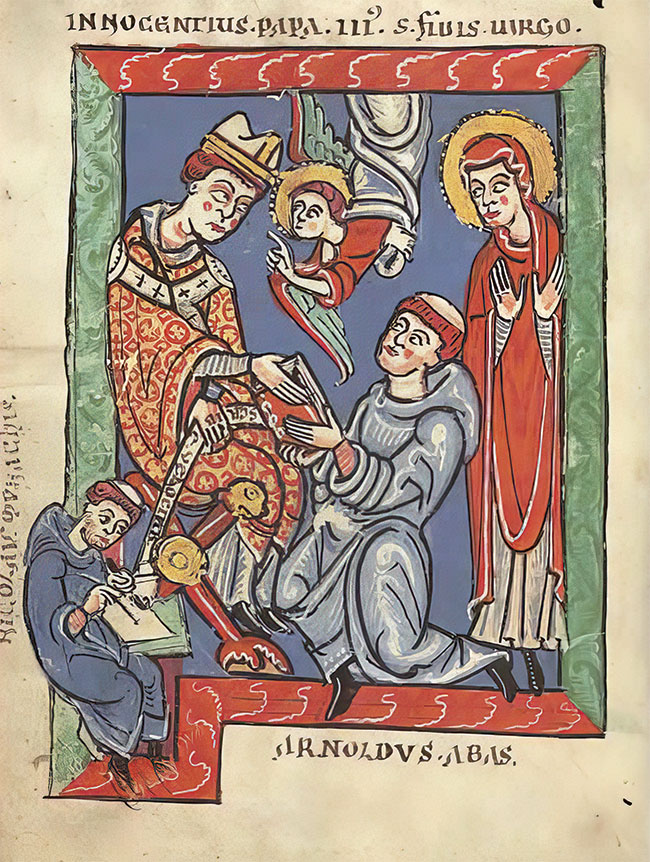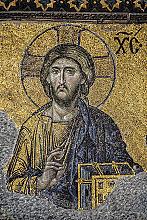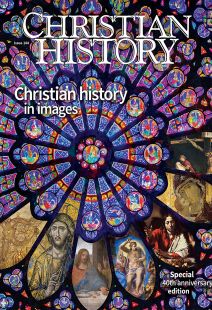Christian History timeline: 2,000 years of Christian history

[Above: Page from the manuscript Sermones of Innocent III. Early 13th c. Prague, Národni knihovna, XXIII F 144 (Lobkowitz 406; formerly
Weissenau Monastery)—Unknown author / Public domain, Wikimedia]
—52 The apostle Thomas reaches India.
—58 Mark is credited with organizing the church of Alexandria.
—65 Peter is executed.
—70 Titus destroys Jerusalem.
—150 Justin Martyr publishes his First Apology.
—180 Irenaeus publishes Against Heresies.
—c. 200 Alexamenos graffito mocks Christians.
—203 Felicity and Perpetua are martyred.
—215 Origen begins writing.
—233–256 A house is converted for worship in Dura Europos, the earliest house church excavated.
—250 Empire wide persecution rages under Emperor Decius.
—270 Antony goes into the desert.
—299 Diocletian persecutes the church.
—301 Gregory the Illuminator brings Christianity to Armenia.
—313 Constantine and Licinius issue the Edict of Milan.
—319 Georgia adopts Christianity.
—c. 320 Pakhom (Pachomius) establishes a communal form of monasticism in the deserts of Egypt.
—325 First Council of Nicaea is held.
—333 Aksum embraces Christianity.
—c. 325–360 Codex Sinaiticus is copied.
—c. 340–397 Mosaic of Ambrose is made in the Milan church of St. Ambrogio, probably from life.
—340 Shapur II of Persia launches a persecution against Christians.
—350 Ephrem the Syrian, theologian and hymn writer, founds the School of Nisibis, arguably the world’s first university.
—c. 350 Syncletica of Alexandria, early desert mother, dies.
—356 Athanasius writes the Life of Antony.
—358 Basil the Great founds a monastery in Cappadocia.
—367 Athanasius writes a letter that formalizes the New Testament canon.
—370 Gregory of Nazianzus preaches his Five Theological Orations.
—379 Famous monastic leader Macrina the Younger dies.
—370 Ulfilas completes translation of the Bible from Greek into Gothic.
—380 Theodosius makes Christianity the state religion of Rome.
—381 First Council of Constantinople is held.
—386 Augustine converts to Christianity.
—405 Jerome completes the Vulgate.
—433 Patrick lights a fire on the Hill of Slane, prompting Irish conversion.
—451 The Council of Chalcedon is held.
—c. 494 The “Nine Saints” arrive in Ethiopia.
—529 Justinian publishes his law code.
—537 Hagia Sophia is built.
—540 Benedict writes his monastic rule.
—563 Columba founds a monastery in Iona, Scotland.
—590 Gregory the Great becomes pope.
—635 Alopen, a Syrian or Persian Christian, arrives in the capital of Tang China. Irish missionary-monk Aidan of Lindisfarne arrives in Northumbria, leading to the conversion of the Anglo-Saxons.
—657 Nun and leader Hilda founds Whitby Abbey.
—663 The Synod of Whitby aligns the English church with Rome.
—716 Boniface begins his missionary career.
—732 At the Battle of Tours, the Frankish general Charles Martel halts a Muslim invasion.
—780 The “Nestorian Stele” is erected near Xi’an telling the story of 150 years of Christianity in China.
—780 Timothy I of Baghdad becomes Catholicos of the Church of the East.
—800 Charlemagne is crowned Holy Roman Emperor.
—863 Cyril and Methodius are invited to share the gospel in Great Moravia.
—910 The monastery at Cluny is founded, beginning a reform movement.
—988 Vladimir I, ruler of Kievan Rus’, adopts Christianity.
—999–1000 Iceland accepts Christianity.
—1054 The East-West (Greek-Latin) Schism is formalized through mutual excommunications.
—1093 Anselm is named archbishop of Canterbury.
—1095 Pope Urban II launches the First Crusade.
—1115 Bernard founds a monastery at Clairvaux.
—1136 Nun, writer, and composer Hildegard of Bingen is elected mother superior of her convent.
—c. 1150 Lombard compiles his Sentences.
—1144–1160 Gothic style begins in France.
—c. 1160–1200 Christ Church Cathedral in Oxford is constructed.
—1181 King Lalibela is enthroned as emperor of Ethiopia. His people will build beautiful churches during his reign.
—1208 Francis of Assisi renounces wealth.
—1211 Santiago de Compostela Basilica is built.
—1215 Innocent III calls the Fourth Lateran Council.
—1223 Influenced by the Franciscans, Elizabeth of Hungary begins charitable works.
—1272 Thomas Aquinas concludes his work on Summa Theologiae.
—1373 Julian of Norwich receives the visions that prompt her work Showings.
—1377–1378 Catherine of Siena writes The Dialogue of Divine Providence.
—1378 The Great Papal Schism begins—it will last until 1417.
—1380 Disciples of John Wycliffe form the Lollard movement.
—c. 1400 Andrei Rublev writes the Trinity icon.
—c. 1400–1500 The Italian Renaissance transforms art, literature, and social mores.
—1453 Constantinople falls to Sultan Mehmed II of the Ottoman Empire.
—1456 Gutenberg produces the first printed Bible.
—1480 The Spanish Inquisition begins.
—1492 Columbus reaches North America.
—1506 Mvemba Nzinga (Afonso I), a devout Christian, becomes king of Kongo.
—1511 Antonio de Montesinos preaches a sermon criticizing Spanish abuses in Hispaniola.
—1514 Bartolomé de las Casas, priest and colonist, has a change of heart regarding indigenous slavery; he later publishes A Short Account of the Destruction of the Indies.
—1517 Luther writes the 95 Theses.
—1521 At the Diet of Worms, Luther refuses to recant his ideas.
—1527 A group of Swiss Anabaptists produces the Schleitheim Confession.
—1529 At the Colloquy of Marburg, Zwingli and Luther cannot reach agreement in their views on the Eucharist.
—1530 The Augsburg Confession, written largely by Philipp Melanchthon, expresses Lutheran beliefs.
—1534 The Act of Supremacy establishes the king as the head of the church in England.
—1536 John Calvin publishes Institutes of the Christian Religion.
—1540–1560 Saint Francis Xavier undertakes missionary journeys.
—1545 The Council of Trent begins.
—1549 The first Book of Common Prayer is published.
—1559 John Knox returns to Scotland.
—1562 Teresa of Ávila opens a strict convent, sparking Carmelite reform. In 1567 Juan de la Cruz joins her reform movement.
—1590 The dome of Saint Peter’s Basilica is finished.
—1601 Jesuit missionary Matteo Ricci becomes the first Westerner invited into the Forbidden City in Beijing.
—1605 Robert de Nobili arrives in India and follows Ricci’s contextual approach to Christian missions.
—1611 The Authorized Version, or King James Bible, is published.
—1678 John Bunyan publishes Pilgrim’s Progress.
—1738 John and Charles Wesley have profound spiritual experiences that spark the Methodist movement.
—1792 William Carey publishes An Enquiry into the Obligations of Christians to Use Means for the Conversion of the Heathens.
—1794 Saint Herman of Alaska begins Orthodox missionary work in Alaska.
—1795 The London Missionary Society is founded.
—1807 Parliament forbids the slave trade in the British Empire—the result, in part, of Christian activism for abolition.
—1816 Richard Allen founds the African Methodist Episcopal Church.
—1833 John Keble preaches the sermon “National Apostasy,” considered to be the beginning of the Oxford Movement.
—1843 Phoebe Palmer publishes The Way of Holiness.
—1854 Hudson Taylor arrives in China.
—1864 Nigerian Samuel Ajayi Crowther is consecrated an Anglican bishop.
—1868 The First Vatican Council begins.
—1875 The first Keswick Convention meets.
—1885 Executions of a number of Catholics and Anglicans, later honored as martyrs, begin in Uganda.
—1904 A large revival begins in Wales.
—1905 Revival breaks out at Pandita Ramabai’s Mukti Mission in India.
—1906 The revival sparking the Pentecostal movement breaks out at Azusa Street in California.
—1907 Inspired by the Welsh Revival and other movements, revival breaks out in Pyongyang, Korea.
—1910 The World Missionary Conference takes place in Edinburgh.
—1929 Revival begins in what is now Rwanda and spreads for over two decades.
—1944 Corrie Ten Boom is released from Ravensbrück concentration camp.
—1950 Mother Theresa begins the Missionaries of Charity.
—1957 Martin Luther King Jr. gives the opening prayer at a Billy Graham crusade, the beginning of a friendship between the two influential ministers.
—1962 The Second Vatican Council begins.
—1978 John Paul II is elected pope.
By the editors
[Christian History originally published this article in Christian History Issue #144 in 2022]
Next articles
2,000 years of Christian quotations
Christians throughout the world and down the centuries testifying to their Savior
selected by the editorsSupport us
Christian History Institute (CHI) is a non-profit Pennsylvania corporation founded in 1982. Your donations support the continuation of this ministry
Donate







